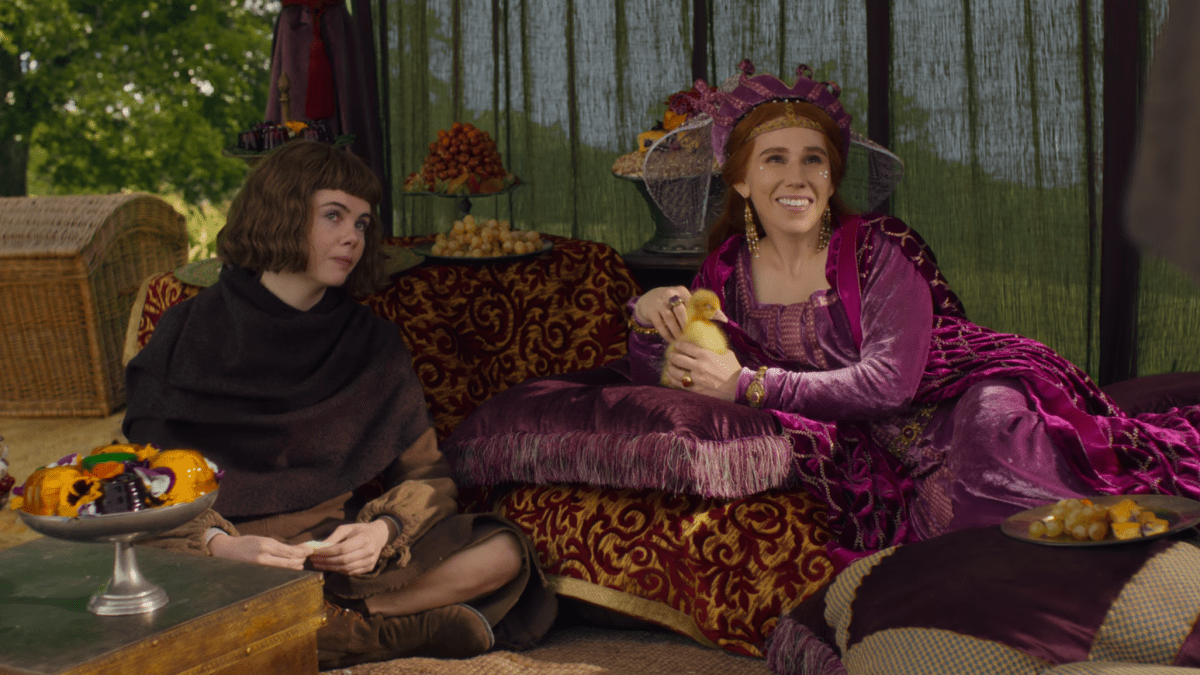From the brilliant mind that brought us Teenage Bounty Hunters, Kathleen Jordan’s latest treasure, The Decameron, is a 14th century absurd dark comedy with a sweet sapphic story tucked inside. Inspired by the Italian short story collection of the same name, The Decameron follows the lives of a handful of quirky nobles and their servants as they head to a private Italian villa in an attempt to escape and wait out the Black Plague — with mixed success.
The series has a similar vibe to Our Flag Means Death or specifically Emily’s mother in Dickinson. It pokes fun at common behaviors of the time period — e.g. thinking the Plague was caused by bad air so rubbing onions over yourself or stuffing flowers in your nose to try to avoid getting it — without being particularly period-specific in other realms: color-blind casting, a modern soundtrack, and language that is almost certainly not how people spoke back then. We’re here for a good time, not a historically accurate time. This works in our favor when it comes to the queer aspects of the show, because while one character does say, “We’re sapphic, on top of all our other sins,” that’s about the extent of the exploration of what homophobia would have been like in 14th century Italy.
If these stories are based on even an ounce of truth, 14th century Italian Christians were extremely horny, as a people, but also very religious. And if these Italian Christians had anything in common with the Italian Christians I was surrounded by growing up half Italian in Catholic schools, the reality was probably a lot more homophobic than the show depicts. I appreciate that choice! It would have been a bummer to watch everyone else be chaotic and messy only to have the gays be tormented. Instead, everyone is equally chaotic and messy and tormented. Everyone has secrets, everyone suffers loss, everyone makes wild mistakes, and everyone has a chance at redemption, whether they take it or not.

What’s also great about this show is that for once, there’s not just one token gay and their partner. There are actually at least five queer canon characters, with the lines a bit blurred on many others. Often if a show has queer male characters they won’t also have queer female characters, even though those storylines appeal to separate (though often overlapping) audiences, so it always does delight me when a show breaks the mold in that way. In this show we have both, and surprisingly the sapphic storyline is the one given more airtime.
The main sapphic in question is Misia, played by Saoirse-Monica Jackson (who you might know from Derry Girls). She’s the doting servant of Pampinea (Zosia Mamet), who is the most absurd person amongst all of these absurd people. She has come to this villa with the intention to marry its Lord and wants nothing more than to be a wife to a wealthy man. When that man is absent upon her arrival, she devolves slowly but surely into full-on delusion as time goes on, trying her best to keep control of the other guests and their servants, all of whom have their own eccentricities and goals. She is kind of awful (in a way that’s fun to watch), but Misia remains loyal to her, always at her beck and call.

I don’t want to get into too many specifics about Misia’s arc throughout the series, especially as it relates to her sapphic storyline. Even though it was just a B plot, it is given love and attention and full of really lovely surprises. There was a moment in the first episode where Misia suffers a loss and I thought Misia was going to be miserable the whole time, but it soon became clear that I was mistaken, and it’s definitely worth following through to the end to watch her story unfold. But as I mentioned before, it’s refreshing to not have her story be exclusively about battling homophobia. In fact, the closest thing to homophobia she experiences is her lady being dismissive of her feelings for another woman. Everyone else either is unaware of her leanings, or indifferent to it, and that’s exactly what I want from a silly show like this. We deserve to be part of the absurdity without catching stray arrows along the way.
Other people staying at the villa include another lady and her servant who are constantly at each other’s throats, Filomena (Jessica Plummer) and Licisca (Tanya Reynolds- from Sex Education!); a spoiled brat of a man (Douggie McMeekin) and his hot doctor who causes a stir in almost everyone he meets (Amar Chadha-Patel); an uber-religious woman trying to resist her horny temptations (Lou Gala) and her husband who prefers the company of men (Karan Gill); and the two remaining servants of the villa who haven’t been taken out by the Plague, their over-exuberant host Sirisco (Tony Hale), and their harried but hilarious cook Stratilia (Leila Farzad.)

Even though it’s an ensemble cast, and the show wouldn’t be the same without any one of them, it doesn’t feel right to call the characters an ensemble. At least, not at first. They all have their selfish goals and can hardly see past their own noses. They’re just running around the villa with their secrets, bumping into each other, to various degrees of disaster.
Despite being, overall, a hilarious romp that pokes fun at classism (and a bit at the hypocrisy of religious institutions), it does have some truly heartfelt moments; discussions of grief and of purpose and of love. By the time the credits rolled on the finale, I was surprised by how attached I had grown to these idiots.
If there’s anything I’ve learned by going through a pandemic of our own, it’s that we have to take care of each other, and even in the darkest times, we have to laugh as often as we can. So if you’re looking for a chance to escape into some absurdity, I highly recommend checking out The Decameron.
All episodes of The Decameron are now streaming on Netflix.







